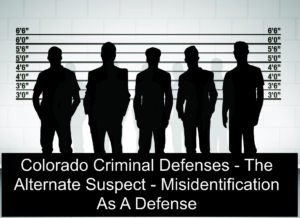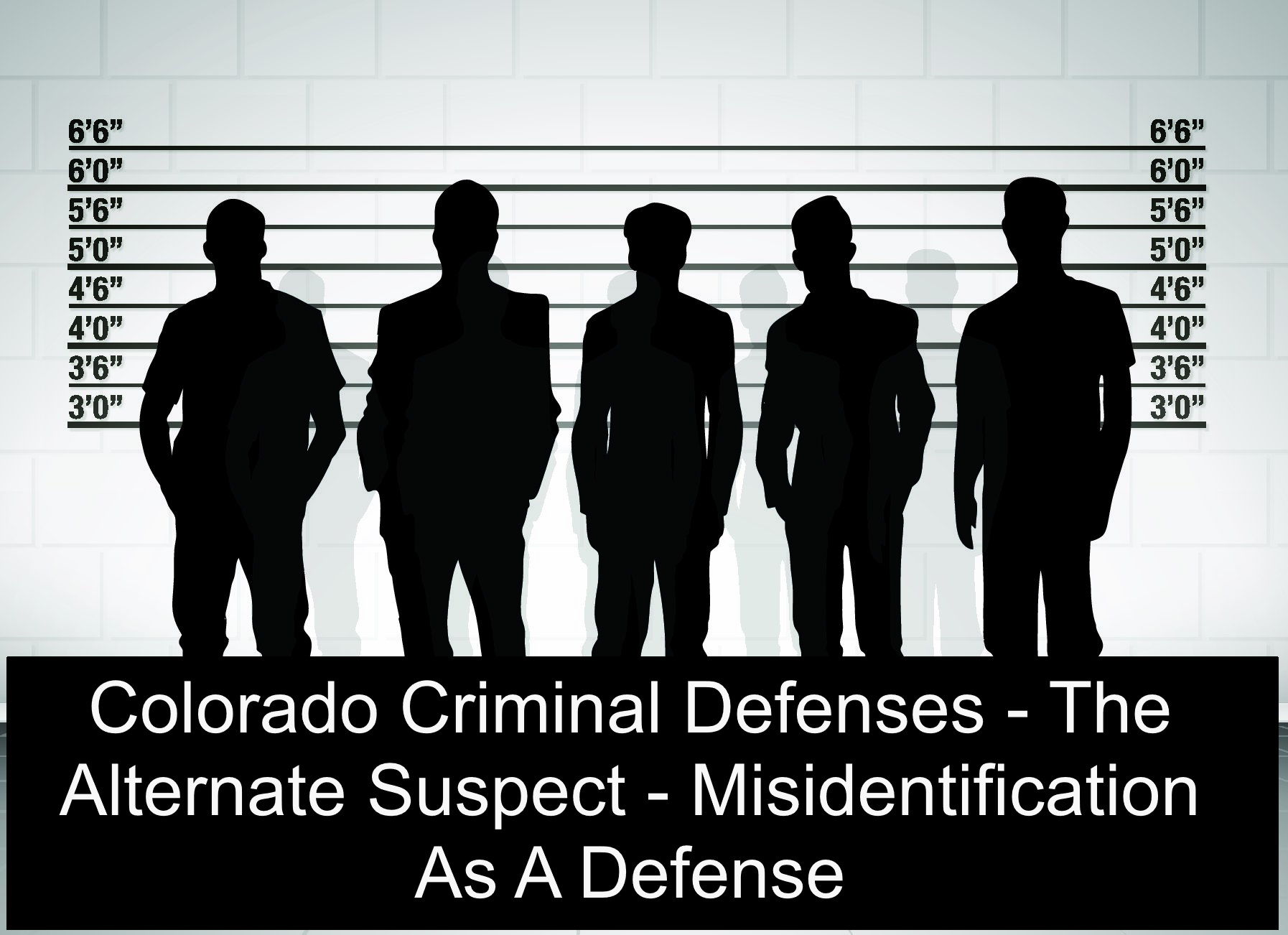




Colorado Criminal Defenses – The Alternate Suspect – Misidentification As A Defense
By H. Michael Steinberg Colorado Criminal Defense Lawyer – Attorney
 Colorado Criminal Defenses – The Alternate Suspect – Misidentification As A Defense – One of the many defenses that may be asserted in a Colorado criminal case is the misidentification defense. A subset of that defense is the “alternate suspect” defense.
Colorado Criminal Defenses – The Alternate Suspect – Misidentification As A Defense – One of the many defenses that may be asserted in a Colorado criminal case is the misidentification defense. A subset of that defense is the “alternate suspect” defense.
This article looks at the law, the tactics, and the strategy of using the alternate suspect defense at trial where misidentification is a viable defense.
Colorado Law On The Alternate Suspect Defense – Analysis
Above all, under Colorado law, a Defendant has a constitutional right to present as complete a defense as is allowed under the law. A Defendant is entitled to every and all reasonable opportunities to present evidence that might tend to create doubt as to his guilt.
Known to defense lawyers as the SODDI defense (some other dude did it), under Colorado law, under the right circumstances, a Defendant may present evidence that another person might have committed the crime or crimes charged.
But assertion of the alternate suspect defense in Colorado has certain legal “limitations.” Defense lawyers are not permitted free reign in asserting the defense. Colorado Judges place pre-requisites on the admission of the alternate suspect defense which limits are intended to:
“…avoid confusing the jury and to prevent alternate suspect evidence from becoming a sideshow that overtakes the principal issue presented at a criminal trial – whether the prosecutor has proved beyond a reasonable doubt that the defendant the crime alleged.”
The Strength Of The “Connection” Between An Alternate Suspect Defense Is Critical To Asserting The Defense
Under Colorado law, the admissibility of the alternate suspect defense at trial ultimately depends on the “strength of the connection between the alternate suspect and the charged crime.”
The framework for the admissibility of alternate suspect evidence essentially turns on what is known as “similar acts evidence analysis“ This analysis is applied by Colorado Judges on a case-by-case basis, looking to whether all the similar acts and circumstances, which taken together, support a finding that the alternate suspect was involved in both the other act and the charged crime.
Alternate suspect evidence must be “relevant” (under Colorado Rule Of Evidence 401) and its probative value must not be sufficiently outweighed by the danger of confusion of the issues or misleading the jury, or by considerations of undue delay (under Colorado Rule of Evidence 403).
The Defendant must show more than an opportunity or motive connecting the alternate suspect to the charged crime…. more than an unsupported inference, or a possible ground for suspicion. There must be a sufficient connection between the alternate suspect and the crime charged such as evidence “indicating any distinctive similarities in the details of the crimes.”
Alternate suspect evidence, taken collectively, must establish a non-speculative connection between the alternate suspect and the charged crime.
The Alternate Suspect Defense – An “Adversarial Testing” Of The Government’s Case
A Colorado Judge cannot restrict the presentation of relevant evidence regarding an alternate suspect defense if the Defendant meets the criteria discussed above.
To deny this evidence is to deny due process -that is …to deny the Defendant an opportunity to meaningfully test the Government’s case in our adversarial system criminal justice system.
The Different Ways To Defend Colorado Criminal Cases – The Tactics Underlying The Alternate Suspect Defense
The most common Defense strategy in a criminal trial is to argue that the State’s case is deficient, is incomplete. Simply that the case has not been proven beyond a reasonable doubt.
A more successful strategy is for the Defense to provide reasoned and supported “alternative explanations” for each piece of harmful evidence. The Defendant did not commit the crime and shed blood in the victim’s car that night – he cut his hand in that car months before during a fishing trip with the victim.
One of the MOST SUCCESSFUL defenses in a criminal case is to provide a very specific version of the evidence that is a complete alternative story which points the finger at named or unnamed others in such a way that there is an explanation for most, if not all of the evidence.
Utilizing this strategy, the Defense provides one or more possible explanations for individual pieces of evidence or for the crime as a whole. Known as the “Story Model” of criminal defense theories, the story model relies on research that establishes that juries will construct “a story” of how they believe a crime occurred. Juries then match their story to the evidence admitted in the case.
When juries are given TWO plausible stories of how a crime occurred – one offered by the Government and one offered by the Defendant – a jury will reduce belief in both stories thus introducing the critical reasonable doubt that points the way to an acquittal – a not guilty verdict.
The SODDI – “Some Other Dude Did It” Defense Strategy.
As noted, Colorado criminal defense lawyers use the alternate suspect defense because it can create this second plausible story in which the jury is directed to another possible perpetrator who could have committed the crime or crimes charged.
Pointing the Finger At An Alternate Suspect May Be Harder Than You Might Think
In most cases other possible Defendants are not only difficult to identify, they are sometimes nearly impossible to find.
When the alternative suspect against whom an accusation of guilt is too farfetched – for example a suspect with no plausible motive, or a suspect with a reasonable time line establishing an alibi for the time and place of the crime, … under these situations pointing the finger at that alternate suspect will be a major mistake
Jury research has suggested that a “weak defense” will actually raise confidence in the prosecution’s case because jurors think believe that if this is the very best the Defendant can do – he must be guilty of the crime. “Enough” plausibility is a question of the degree of persuasion required in a given case and will almost always be “case-specific.”
Furthermore, jury research shows that:
“a defense strategy that argues not only that the defendant is innocent, but also that some other individual could have committed the crime, is more likely to result in acquittal.”
It is clear that an “alternate vision” in a misidentification case is more compelling than arguing only that the State has failed to meet its burden of proof beyond a reasonable doubt.
Summary And Conclusion – Colorado Criminal Defenses – The Alternate Suspect – Mis-Identification As A Defense
Finding a viable “alternate suspect” is not an easy task and the construction of multiple theories in the defense of a criminal case is a demanding and complex task.
A SODDI strategy is more than an attempt to refute the State’s case, it creates a plausible alternative explanation of the events and the evidence in a criminal case . A plausible alternate suspect theory centers itself around alternative motives, alternative interpretations of sometimes ambiguous behaviors, and most importantly, alternative and plausible explanations for the “most damning” pieces of evidence.
Humans by their very nature are explanation seekers. They not only want to know that something happened that want to know how and why it happened. The alternate suspect defense provides plausible alternative stories that satisfies the jury’s need for an explanation of the evidence presented by the State at trial.
Colorado Criminal Defenses – The Alternate Suspect – Misidentification As A Defense
If you found any of the information I have provided on this web page article helpful please click my Plus+1 or the Share buttons for Twitter and Facebook below so that others may also find it.
The reader is admonished that Colorado criminal law, like criminal law in every state and at the Federal level, changes constantly. The article appearing above was accurate at the time it was drafted but it cannot account for changes occurring after it was uploaded.
If, after reading this article, you have questions about your case and would like to consider retaining our law firm, we invite you to contact us at the Steinberg Colorado Criminal Defense Law Firm – 303-627-7777.
Never stop fighting – never stop believing in yourself and your right to due process of law. You will not be alone in court, H. Michael will be at your side every step of the way – advocating for justice and the best possible result in your case. H. Michael Steinberg is passionate about criminal defense. His extensive knowledge and experience of Colorado Criminal Law gives him the edge you need to properly handle your case

ABOUT THE AUTHOR: H. Michael Steinberg – Email The Author at:
A Denver Colorado Criminal Defense Lawyer – or call his office at 303-627-7777 during business hours – or call his cell if you cannot wait and need his immediate assistance – please call 720-220-2277.
“A good criminal defense lawyer is someone who devotes themselves to their client’s case from beginning to end, always realizing that this case is the most important thing in that client’s life.”
You should be careful to make a responsible choice in selecting a Colorado Criminal Defense Lawyer. We encourage you to “vet” our firm. Over the last 40 plus years – by focusing ONLY on Colorado criminal law – H. Michael has had the necessary time to commit to the task of constantly updating himself on nearly every area of criminal law, to include Colorado criminal law and procedure and trial and courtroom practice.
Putting more than 40 years of Colorado criminal defense experience to work for you.
H. Michael works hard to get his clients the best possible results in and out of the courtroom. He has written, and continues to write, extensively on Colorado criminal law and he hopes this article helps you in some small way – Colorado Criminal Defenses – The Alternate Suspect – Misidentification As A Defense.

Other Articles of Interest:
- Colorado Criminal Law Guide – Alternate Suspect Defense – When Someone Else Committed The Crime
- Criminal Defenses and Theories Of Defense In Colorado
- Tactics Defenses and Strategy
- Your Miranda Rights I
- Your Miranda Rights












